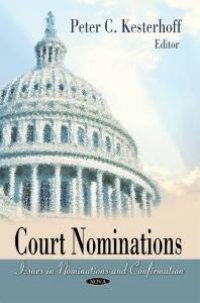
Ebook: Court Nominations: Issues in Nomination and Confirmation : Issues in Nomination and Confirmation
Author: Peter C. Kesterhoff
- Tags: Judges--Selection and appointment--United States.
- Year: 2009
- Publisher: Nova Science Publishers
- City: New York, United States
- Edition: 1
- Language: English
- pdf
This new book sheds light on whether Senate processing of lower court nominations, particularly to the courts of appeals, has tended over recent decades to slow down in presidential election years. The report begins by reviewing recent debate, and historical events dating back to 1980, concerning whether the Senate and its Judiciary Committee customarily observe a practice referred to as the "Thurmond rule." Next, the report provides narratives on each presidential election year from 1980 to 2004, reviewing Senate and committee actions taken on court of appeals and district court nominations in each of the years. The book then compares these years quantitatively, examining the number and percent of nominations processed and the last dates of committee and Senate action taken. Findings include the following: Senators of both parties at different times have spoken of their expectations of a drop-off in processing of judicial nominations occurring earlier in presidential election years than in other years. However, there is no written Senate or Judiciary Committee rule -- nor was any bipartisan agreement reached during the 1980-2004 period -- concerning judicial nominations in presidential election years. The Senate has, on average, confirmed fewer court of appeals nominees in presidential election years than in any other year of a presidential term between 1977 and 2007. In the presidential election years from 1980 to 2004, there was no consistently observed date after which the Judiciary Committee or Senate ceased processing lower court nominations; however, in the three most recent completed presidential election years, the Senate confirmed its last court of appeals nominee in July or earlier, while in the four preceding presidential election years, the Senate confirmed its final court of appeals nominee in October or later. On average, fewer court of appeals nominations received hearings, were reported, and were confirmed in the three most recent completed presidential election years (1996, 2000, and 2004) than in the four preceding presidential election years (1980, 1984, 1988, and 1992). From 1980 to 2004, the Senate confirmed, on average, more nominations (and a greater percentage of pending nominations) in years when the Senate majority was of the President's party than years in which partisan control of the presidency and the Senate was divided. The report also outlines relevant considerations for Senators in deciding whether to seek to speed or slow the judicial confirmation process in a presidential election year. These considerations include the public policy views of the incumbent President (and his successor), patronage considerations for Senators of both political parties, the appearance of a partisan judicial confirmation process, and whether a slowdown might greatly affect the judicial vacancy rate.
Download the book Court Nominations: Issues in Nomination and Confirmation : Issues in Nomination and Confirmation for free or read online
Continue reading on any device:

Last viewed books
Related books
{related-news}
Comments (0)